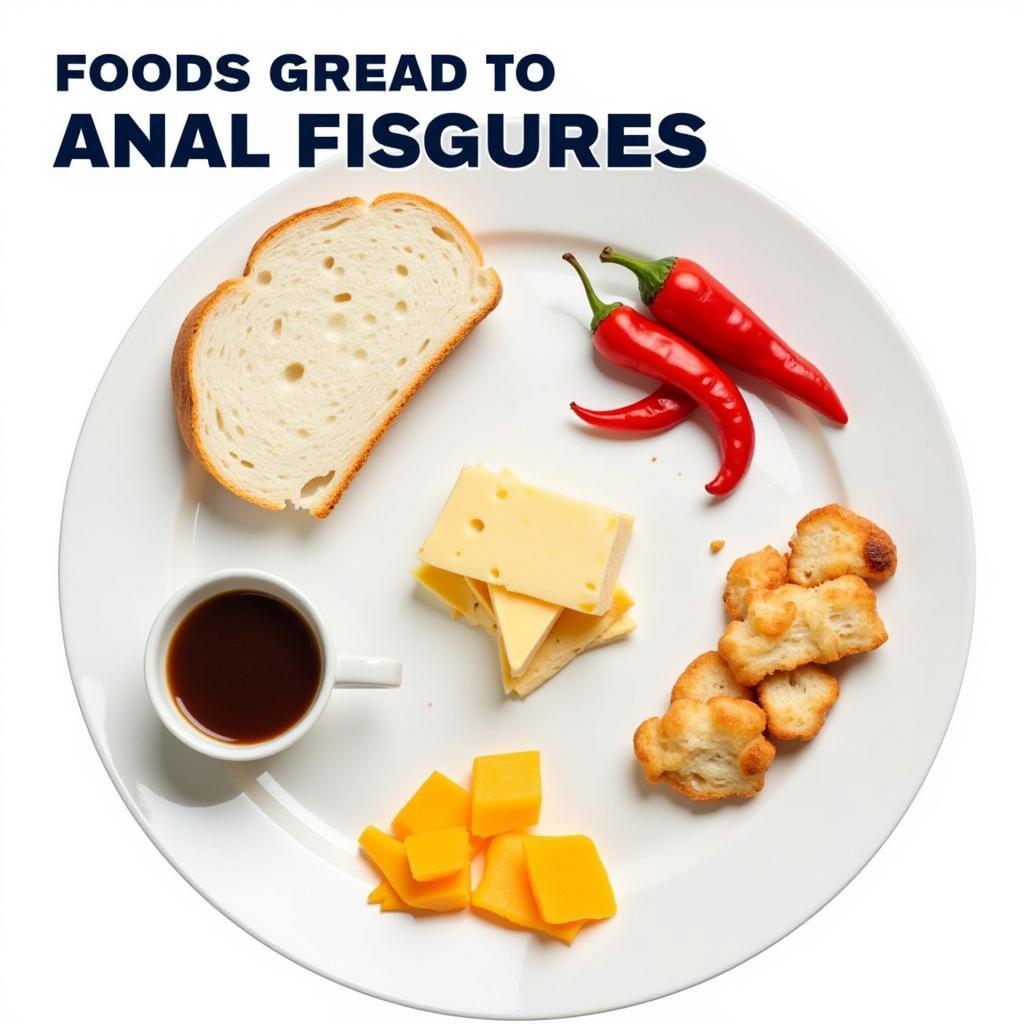Dealing with an anal fissure can be incredibly uncomfortable. Knowing which Foods To Avoid With Anal Fissure can significantly impact your healing journey and reduce discomfort. This article explores common food triggers and offers practical advice on dietary adjustments to promote faster recovery.
Understanding the Impact of Diet on Anal Fissures
Anal fissures, those small tears in the lining of the anus, are often aggravated by bowel movements. Hard, dry stools can further irritate the fissure, causing pain and delaying healing. Therefore, managing your diet plays a vital role in managing your symptoms and promoting healing. What you eat directly affects the consistency of your stools. By avoiding certain foods, you can soften your stools and reduce the strain during bowel movements.
Foods that Can Aggravate Anal Fissures
Several foods are known to exacerbate anal fissure symptoms due to their tendency to cause constipation or irritation. These include:
- Low-fiber foods: White bread, white rice, processed snacks, and fast food often lack the fiber necessary for smooth bowel movements.
- Spicy foods: Spicy dishes can irritate the sensitive lining of the anus, increasing discomfort and potentially slowing down the healing process.
- Dairy products: Dairy can be constipating for some individuals, contributing to harder stools that can worsen fissure pain.
- Caffeinated beverages: Coffee, tea, and energy drinks can dehydrate the body, leading to harder stools and increased straining.
- Alcohol: Similar to caffeine, alcohol also contributes to dehydration, which can exacerbate anal fissure symptoms.
- Fatty and greasy foods: Foods high in fat can make stools looser and more frequent, which can irritate an existing fissure.
- Citrus fruits: While generally healthy, citrus fruits and their juices can be irritating to some people, particularly those with anal fissures.
 Foods to Avoid with Anal Fissure
Foods to Avoid with Anal Fissure
What Should I Eat if I Have an Anal Fissure?
While knowing what to avoid is important, focusing on what to include in your diet is equally crucial. Prioritizing fiber-rich foods is key to softening stools and promoting regular bowel movements.
- High-fiber foods: Fruits like apples, bananas, and berries, along with vegetables like broccoli, spinach, and carrots, are excellent sources of fiber.
- Whole grains: Opt for whole-wheat bread, brown rice, and oatmeal over refined grains.
- Legumes: Lentils, beans, and chickpeas provide substantial fiber and can be incorporated into various dishes.
- Flaxseeds and chia seeds: These tiny seeds are packed with fiber and can easily be added to smoothies, yogurt, or cereal.
- Plenty of fluids: Staying hydrated is essential for softening stools. Water is the best choice, but you can also include herbal teas and fruit-infused water.
“A high-fiber diet is the cornerstone of anal fissure management,” says Dr. Emily Carter, a gastroenterologist with over 15 years of experience. “By incorporating plenty of fiber-rich foods and staying hydrated, patients can significantly reduce their symptoms and promote healing.”
Managing Anal Fissure Discomfort
Besides dietary changes, other strategies can help manage anal fissure pain and promote healing. Sitz baths, warm soaks in a few inches of water, can soothe the area and promote relaxation. Over-the-counter pain relievers and topical creams can also provide temporary relief.
“Don’t hesitate to seek medical advice if your symptoms persist or worsen,” adds Dr. Carter. “While dietary changes are often effective, some fissures may require medical intervention.”
Conclusion
Understanding the impact of diet on anal fissures is critical for effective management. By avoiding trigger foods and embracing a fiber-rich diet, you can significantly reduce discomfort and promote healing. Remember to stay hydrated and consult with a healthcare professional if your symptoms persist or worsen. Managing foods to avoid with anal fissure is a key step in your recovery.
FAQs
- What is the best thing to eat for anal fissures? High-fiber foods and plenty of fluids are the best for anal fissures.
- What foods soften stool quickly? Prunes, kiwis, and flaxseeds are known to soften stool quickly.
- How can I soften my stool immediately? Drinking plenty of water and eating high-fiber foods can help soften your stool.
- Can certain foods irritate anal fissures? Yes, spicy foods, dairy products, and citrus fruits can irritate anal fissures.
- How long does it take for an anal fissure to heal? Healing time varies, but with proper care, most fissures heal within a few weeks.
- Should I see a doctor for an anal fissure? If your symptoms are severe or don’t improve with home care, see a doctor.
- Are there any other remedies for anal fissure pain besides diet? Sitz baths and over-the-counter pain relievers can provide relief.
Need more help? Contact us at Phone Number: 02437655121, Email: minacones@gmail.com or visit us at 3PGH+8R9, ĐT70A, thôn Trung, Bắc Từ Liêm, Hà Nội, Việt Nam. We have a 24/7 customer support team.